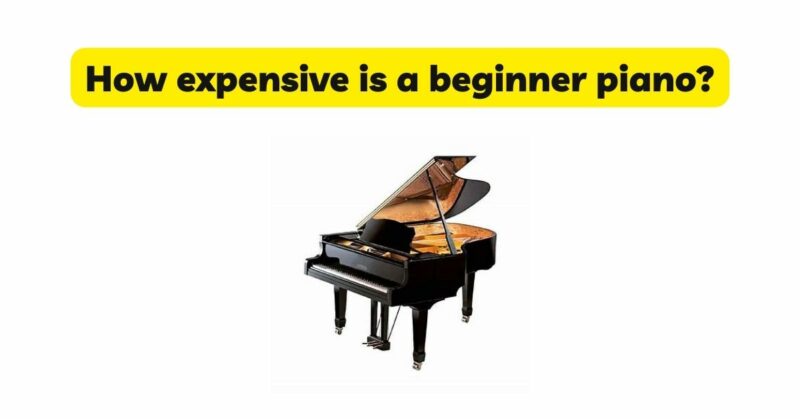Aspiring pianists often wonder about the cost of a beginner piano. The price of a beginner piano can vary significantly depending on several factors, including the type of piano, brand reputation, size, quality, and additional features. Understanding the cost range for beginner pianos is essential to make an informed decision and find an instrument that suits both your budget and musical aspirations. In this article, we will explore the various factors that influence the cost of a beginner piano and provide insights into the price ranges you can expect.
Factors Influencing the Cost of a Beginner Piano:
- Type of Piano: The type of piano is a significant factor in determining its cost. Acoustic pianos, including upright pianos and grand pianos, tend to be more expensive than digital pianos. Acoustic pianos offer an authentic playing experience and a rich, resonant sound but require regular tuning and maintenance. Digital pianos, on the other hand, are electronic instruments that simulate the sound and feel of an acoustic piano. They are generally more affordable, offer additional features, and require minimal maintenance.
- Brand Reputation: Brand reputation plays a role in the pricing of beginner pianos. Established brands with a long history of craftsmanship, such as Steinway & Sons, Bösendorfer, Yamaha, and Kawai, often command higher prices due to their reputation for quality, innovation, and durability. These brands have a track record of producing instruments with exceptional sound and build. However, it’s important to note that lesser-known brands can also offer high-quality beginner pianos at more affordable prices.
- Size and Construction: The size and construction of a piano can influence its cost. Grand pianos, with their larger size and complex construction, tend to be more expensive than upright pianos. Grand pianos offer superior sound projection, tonal range, and playing experience but require more space and maintenance. Upright pianos, though more compact, can still provide excellent sound and playability at a more affordable price point, making them a popular choice for beginners.
- Quality and Materials: The quality of materials used in the construction of a piano affects its cost. Higher-quality pianos utilize superior woods, soundboards, strings, and hammers, resulting in a more refined sound and better durability. Pianos with better craftsmanship and attention to detail command higher prices due to the expertise and labor involved in their production. However, even entry-level pianos can provide satisfactory quality for beginners at a more accessible price range.
- Additional Features and Customizations: The inclusion of additional features and customizations can impact the cost of a beginner piano. Digital pianos often come with built-in speakers, headphone connectivity, recording capabilities, and a variety of instrument sounds, which can increase their price. Acoustic pianos may offer custom finishes, special design elements, or unique cabinet styles that add to their aesthetic appeal and cost. Consider which features are essential to your learning and playing experience when evaluating the price range.
Price Range for Beginner Pianos:
- Digital Pianos: Entry-level digital pianos can range from around $300 to $1,500, depending on the brand, features, and quality. In this price range, you can find digital pianos with weighted or semi-weighted keys, touch sensitivity, built-in speakers, headphone connectivity, and basic recording capabilities. Higher-end digital pianos with more advanced features and better sound quality can reach prices of $1,500 to $3,000 or more.
- Upright Pianos: Entry-level upright pianos typically start around $3,000 and can go up to $10,000 or more. These pianos offer a traditional acoustic playing experience with a vertical design. The price range for upright pianos depends on factors such as brand reputation, size, materials used, and craftsmanship. Higher-end upright pianos from renowned brands can reach prices exceeding $20,000.
- Grand Pianos: Entry-level grand pianos usually start around $10,000 and can range up to $100,000 or more. The price of grand pianos is influenced by factors such as size, brand reputation, quality, and construction. Larger grand pianos with better craftsmanship and premium materials command higher prices. High-end grand pianos from renowned brands can reach prices well into the six-figure range.
Conclusion:
The cost of a beginner piano depends on various factors, including the type of piano, brand reputation, size, quality, materials used, and additional features. Digital pianos offer a more affordable option, with entry-level models starting around $300 and higher-end models reaching $1,500 to $3,000 or more. Upright pianos, providing a traditional acoustic playing experience, start around $3,000 and can go up to $10,000 or more. Grand pianos, known for their exceptional sound and performance, typically start around $10,000 and can reach six-figure prices for high-end models.When considering the cost of a beginner piano, it’s important to find a balance between your budget and the quality, features, and long-term aspirations you have for your musical journey. Assess your needs, preferences, and available financial resources to determine the appropriate price range for your beginner piano. Remember that regardless of the price range, the most crucial aspect is finding an instrument that inspires and supports your passion for playing the piano.


